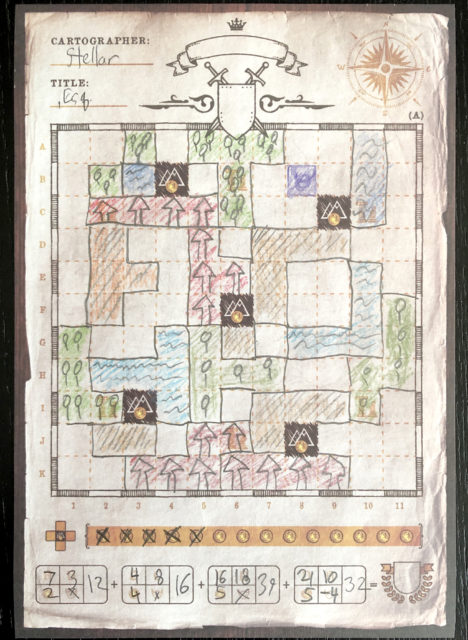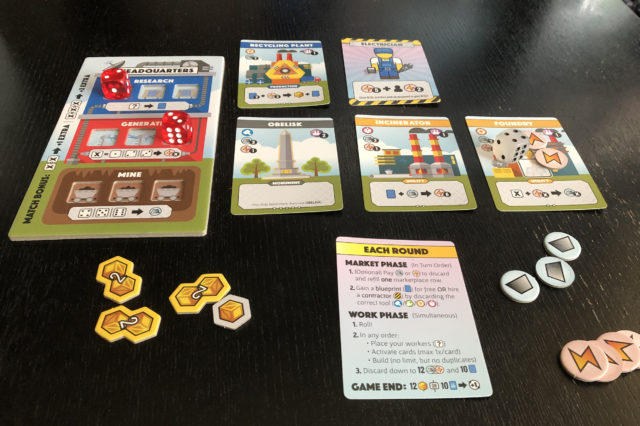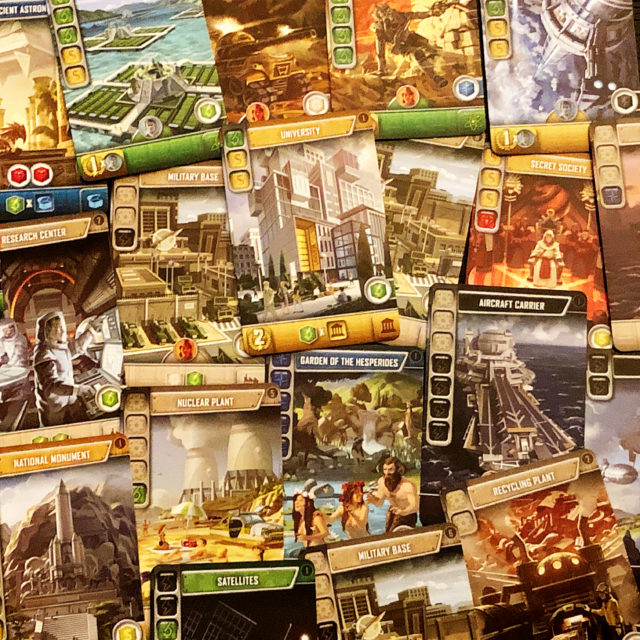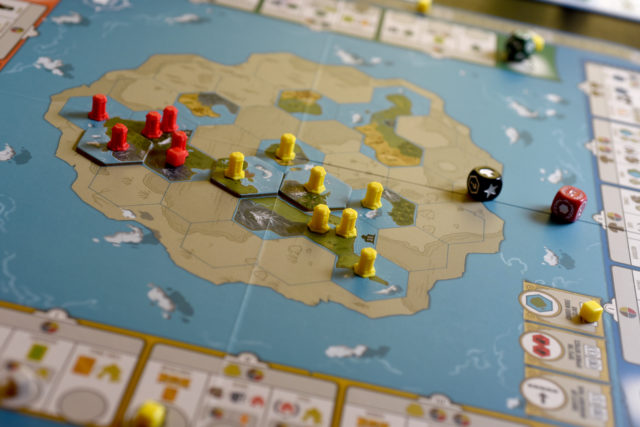It was almost two years ago that I shared my list of favourite solo games. For the last few months I’ve been remarking on how many new great solo and solo-friendly games have been released over the past year or so. Designers are ever more aware that tabletoppers like having the option to play solo if they can’t (or don’t want to) find opponents. Given current circumstances, it seems more timely than ever to write an update of this new crop. Obviously there are many digital options out there for people who want to get their game on, and we’re lucky to be living in a time when those are available. But we’ve got to take a break from staring at screens sometime. Don’t we?
To me, a great solo game (or mode) gives the player just as many interesting decisions as multiplayer, with extra points given to designs that simulate a logical but unpredictable opponent with as few extra rules and frills as possible. And so, in alphabetical order, here is a bouquet of solitary delights:
Blackout: Hong Kong: I’ve already written about the care that Alexander Pfister has put into solo modes for his recent games, so impressive though it is it should come as no surprise that he has two entries on this list. B:HK combines deckbuilding, area control, rondel-based resource generation and management in a brain-melty puzzle combination. Every round players choose three workers from their hands (four once they unlock that upgrade) for their actions, gathering resources and money to spend them on new and better workers, completing missions, and building chains of outposts on the map. It’s well-suited to solo-play because it is inherently goal-driven due to its Emergency Plans as well as being time-limited due to the size of the starting deck. The solo version of the campaign is challenging and forces the solo player to be ruthlessly focused and efficient.
Blight Chronicles: Agent Decker: Three years ago I sang the praises of Board&Dice’s mutant deckbuilder port of the innovative FPS Superhot, which was based a PnP called Agent Decker designed by Manuel Correia’s. So when they Kickstarted a souped-up version of the latter I was on-board from the get-go. As is usual for KS, it took longer than expected to land, but it delivered in terms of providing a Thief-like stealth experience with a branching campaign. Your mission is to rescue a scientist kidnapped by an evil cartel and sequestered somewhere in their hideout. You have to know when and whether to avoid cameras, minions and when to take them out, which lets you incorporate them into your deck as new and more powerful cards. I just hope they end up providing more content, as the base game only has the one mission and two possible agents, which admittedly play quite differently.

Cartographers: One of the best flip’n’writes out there, Cartographers has you mapping out a fantasy realm over four seasons of unpredictable length. Each flipped card gives you two possible ways you can continue to fill in your gridded map–and there are also occasional baddies which muck up your plans. After the end of each season you will get points according to two criteria randomly chosen at the start of the game, as well as points gained for accumulated gold and lost for unopposed monsters. It requires almost no adaptation to solo. Just add the four numbers in the bottom corner of each of the scoring cards together and compare them to your score. Simple, elegant, and totally fiddle-free.
Cities Skylines: Another port of a popular videogame franchise, CS is a perfect-information co-op game which manages to evoke the SimCity experience with a minimum of micro-managing. On your turn you must play a card, adding a new zone to your city which generally helps things along but also costs resources–or you can pay money to exchange a card from your hand from one of the draw piles. Money starts off plentiful but rapidly becomes very tight and you need it for everything, including and most especially passing from one era of the game to the next. After three eras you compare your city’s accumulated happiness against the game, but even though I’ve never won a game I want to keep playing until I do.

Fantastic Factories: This great gateway game is a dice-rolling worker-placement race to produce the most goods. Each round has two phases; first, you get to draft a new specialist or building from the central market; then, you roll your dice and place them on your buildings to produce metal, energy, and generic goods which act as the game’s time-clock. The game ends when someone has produced 12 goods, and then you add in points produced by buildings to find a winner. The solo mode pits you against a rapacious bot who hoovers up buildings and produces goods at a frightful pace (which you can calibrate to your chosen difficulty). It is, if you’ll pardon the term, fantastic.

It’s a Wonderful World: Just reviewed this last month, and I can’t think of another pass-drafting game with a solo mode, let alone such a good one. You still have four rounds to score as many points as possible, but this time you “draft” twice a round and can spend cards to mill the draw deck if you need to. No opponent, just trying to meet or beat a preset threshold, but that’s compensated for by having six different scenarios which start you off with specific cards and goals.
Mapmaker: the Gerrymandering Game: Being both a political AND math junkie, this indie game is like catnip for me but it may have slipped under your radar–but it shouldn’t, because its theme is all too current (not so much in Canada, though, thankfully). Players take the role of political parties taking turns placing boundaries in a randomly-generated region so as to favour their party in as many districts as possible. Great little puzzle game, just as effective solo as it is with two through four players.
Maquis: To be fair, this game has been around for years as a PnP and app but was recently released in a proper box and everything, and for what it is it’s great–namely, a minigame about running a local French Resistance cell during WWII. Different missions every game, tense, great choices.

Maracaibo is the second Pfister on the list and arguably his best Euro-with-a-campaign mode game so far–well, I think it is, anyway. Over four rounds you travel in a linear path around the Caribbean, stopping to take actions and build buildings. You also have an explorer hacking her way across the northern Amazon, which can reap major rewards. It’s a bit of a beast to learn, only because there are so many moving parts, and the combat system is a little confusing at first. But it reeks with theme with many paths to victory (some definitely not obvious at first) and the solo mode is very challenging because your virtual opponent whips around the board so quickly you don’t have very much time to put your engine together. Again, ruthless efficiency is the order of the day, avast ye mateys.
On Mars: I have played many hundreds of games in my lifetime, but this one for whatever reason has been one of the hardest to learn even though its many mechanics all mesh with its theme very well. At heart it’s a worker placement game, with different sets of actions available depending on whether you’re in orbit around Mars or on the surface. You have group missions to complete as well as secret private missions, all of which give you valuable boosts. There’s just lots of subsystems and little rules to remember and you have to turn to BGG to download a coherent summary of them all. And still you’re gonna forget stuff. But pound for pound it’s one of the best and most involving games I have ever played and its Automa-driven solo mode is just as satisfying to play as multiplayer. There’s a module on Tabletopia you can try out to see if it’s your cup of tea, because for $150 you don’t wanna buy this unless it truly is your jam.

Tapestry: Yes, I still like it (you can read why here). But it has proved not to be the be-all-and-end-all Civ game that the hobby was hoping for. Which is all the more reason to enjoy its Automa-driven solo mode. Right now it’s the only game in town if you want a Tabletop-driven solo Civ-like experience. Don’t like it? Design a better one. I dare you.
Paladins of the West Kingdom was my choice for best game of 2019 and I stick by that, in part because of its excellent card-driven solo mode against a virtual opponent. Paladins puts novel twists on the worker-placement mechanic, starting with the deck of Paladins you will work through over the game’s seven rounds which will partially determine which types of workers you will get to use that round, as well as giving you a specific benefit for the round. Each action requires a different mix of workers, and you have plenty of ways of mitigating luck. It just all meshes together so well, and is definitely my favourite of the series so far.
And there you have it. If any of the above sound tempting, please consider ordering from your FLGS; if yours are like mine, they’re struggling right now.
Great, now I have to look more into “It’s a Wonderful World” and “Fantastic Factories”. I was very close to getting Fantastic Factories at PaxUnplugged, but I had already bought too many games! Thanks for the good read 🙂
No problem! Thanks for reading!
For Tapestry, you quoted this: “Don’t like it? Design a better one. I dare you.”
“Civilization: A New Dawn” with the automa mode that came out last year, anyone?!? BAM!
Agreed. It’s great!
[…] Lots of games can be played solo either straight out of the box or with a supporting application. You are either aimed to be a target score or there is a script for one or mor enemy players. It’s not idea for socialising but as a change of pace and get away from the screen. Stonemaier games have great solo modes, look for automato factory.http://dailyworkerplacement.com/2020/03/23/an-introverts-dozen-twelve-recent-games-that-play-great-s…https://boardgamegeek.com/geeklist/264253/2019-peoples-choice-top-200-solo-games-200-1https://thebests.kotaku.com/the-best-solo-board-games-1842384537 […]